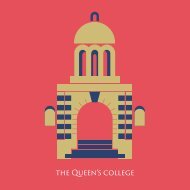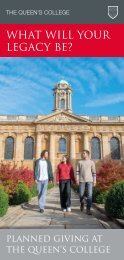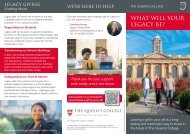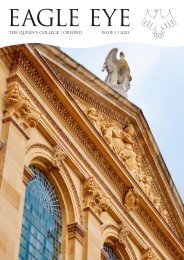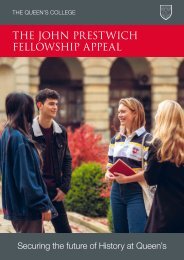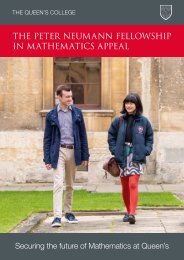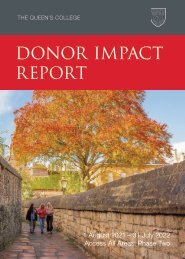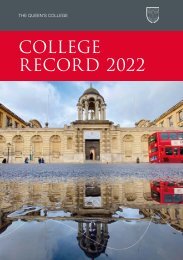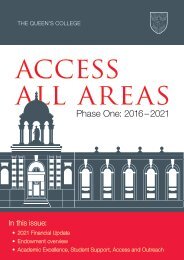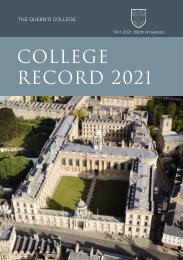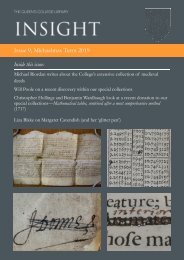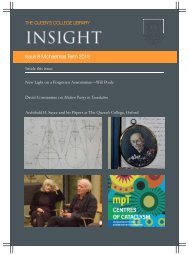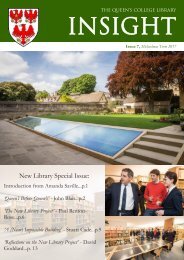The Queen's College Record 2023
You also want an ePaper? Increase the reach of your titles
YUMPU automatically turns print PDFs into web optimized ePapers that Google loves.
KARL LEHMANN<br />
My husband Karl Lehmann died in September 2022 at the<br />
age of 101 and a half. Going through Karl’s effects, I found<br />
a stack of his Oxford essays written between 1939 and<br />
1942 and still held together by 1940s paper clips, now<br />
badly rusted. Also preserved are the dreams he recorded<br />
for a few months in 1942: during internment Karl had<br />
developed an interest in the theories of Carl Jung inspired<br />
by the late-night discussions of two psychiatrists who had their mattresses close<br />
to his. Karl was classed as an enemy alien and here is how he described the start<br />
of his internment: “Early on the 25 th of June 1940, a policeman called at Queen’s<br />
<strong>College</strong> and told me to accompany him to Oxford police station. He gave me half an<br />
hour to pack some clothes and a few books. At the station, other category C aliens<br />
were assembling during the morning – about 150 in all – and at lunchtime we were<br />
put onto coaches going to an unknown destination.” Released and back at Queen’s<br />
early in 1941, he and his fellow students received a note from the Bursar alerting them<br />
to the bedmaker crisis. Only two regular bedmakers were left and, because of this,<br />
they should help “by tidying your rooms…putting your clothes away in cupboards<br />
or drawers and, if you can, by making your beds.”<br />
Obituaries<br />
Karl was born in Cologne in 1921. In 1936, as conditions in Germany worsened,<br />
his parents sent him to school in England – Leighton Park in Reading. <strong>The</strong> school<br />
helped him to adapt quickly to a new language and new customs, and the bond<br />
with LP lasted a lifetime with regular visits to view new facilities or discuss school<br />
history with the archivist.<br />
Karl made his career at the BBC Monitoring Service in Reading. This was set up<br />
as a wartime operation where teams of linguists, many of them refugees, listened to<br />
foreign broadcasts in order to extract useful information for the government. Karl’s<br />
time at Monitoring covered World War Two and the subsequent cold war. Two of the<br />
high points he used to talk about were the Cuban missile crisis of 1962 and the death<br />
of Hitler. He was on duty in the evening of 1 May 1945 when German radio listeners<br />
were told to stand by for an important announcement. Preceded by solemn music, the<br />
announcement, when it came, said that Hitler was dead. As Karl recalled: “<strong>The</strong>y said he<br />
had fallen fighting Bolshevism. I felt total relief because Hitler had ruined my life. We were<br />
the first people in Britain to hear the announcement and the entire building cheered.”<br />
Karl retired as Editor of News and Publications in 1981 and subsequently devoted<br />
himself to his two main hobbies – tennis and horseracing. He played tennis into his<br />
nineties – doubles of course – while the horses led to regular outings to Cheltenham,<br />
Ascot, Newbury. He was not unsuccessful. One of his triumphs was last year’s Grand<br />
National in which he picked the winner – Noble Yeats – and backed it at 66 to 1.<br />
Helga Lehmann<br />
<strong>College</strong> <strong>Record</strong> <strong>2023</strong> | <strong>The</strong> Queen’s <strong>College</strong> 113




